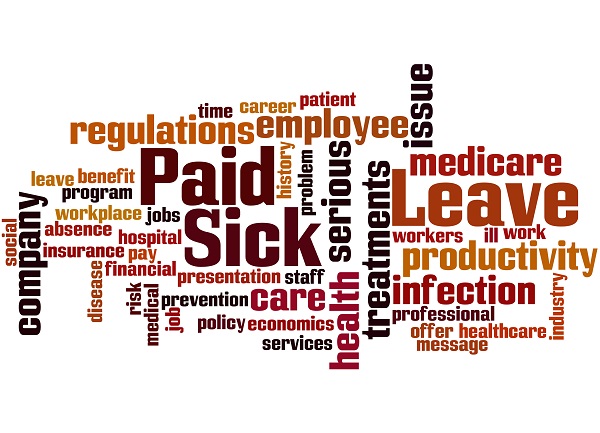What Is Hip? What Employers Must Know About California’s Heat Illness Prevention (“HIP”) Regulation
By DeAnn Chase December 20, 2016 Category: Business Law

The California Occupational Safety and Health Division issued a “High Heat Advisory,” warning employers to protect their outdoor workers from heat illness as temperatures went over 100 degrees in many areas of California. This should remind employers about the requirements of California’s Heat Illness Prevention (“HIP”) regulation, adopted in 2015. HIP sets specific requirements for potable water, shade, cool-down periods, high-heat procedures, emergency preparedness, and acclimatization, training, and plans for heat illness prevention. Pursuant to HIP, employers must Provide free water that is "fresh, pure, suitably cool" so that each employee may drink at least one (1) quart per hour.... READ MORE
City Of Los Angeles Passes Paid Sick Leave Ordinances
By DeAnn Chase December 15, 2016 Category: Business Law

Due to apparent dissatisfaction with paid sick leave as provided at the California state level, the cities of Los Angeles and San Diego have passed ordinances granting sick leave to qualified employees. Employers should note that the permissible uses under both ordinances are broader than California law. As of July 1, 2016, many employees within the City of Los Angeles will be entitled to accrue 48 hours of paid sick leave per year. Los Angeles Ordinance The state paid sick leave law does not supersede local ordinances, and employers must comply with both the state and the local laws, whichever... READ MORE
OSHA Publishes Its Final Rule On Electronic Reporting Of Workplace Injuries And Illnesses
By DeAnn Chase December 13, 2016 Category: Employment

On May 12, 2016, the Occupational Safety and Health Administration (OSHA) published its final rule on electronic reporting of workplace injuries and illnesses. Pursuant to this rule, OSHA will be publishing employer injury and illness records on the internet, although these cases will offer no explanation of the facts and circumstances involved. These new provisions on electronic reporting take effect on January 1, 2017, and require many types of employers to electronically submit injury and illness data. OSHA now requires each separate workplace with 250 or more employees in qualifying industries to submit information from their 2016 recordkeeping of injuries... READ MORE
What Employers Should Know About The California Data Protection Act
By DeAnn Chase December 07, 2016 Category: Business Law

The California legislature passed the nation’s first data breach notification statute in 2003, the California Data Protection Act (CDPA). Since this landmark legislation was enacted, over 30 states have passed similar statutes. The law is another example of California's trendsetting legislation in the area of privacy. What the CDPA requires The CDPA requires that any business that “owns or licenses personal information about a California resident shall implement and maintain reasonable security procedures and practices appropriate to the nature of the information, to protect the personal information from unauthorized access, destruction, use, modification, or disclosure.” Further, it requires a business... READ MORE
Spokeo v. Robins: Concrete Injury And Statutory Damages
By DeAnn Chase December 05, 2016 Category: Business Law

In Spokeo v. Robins, the U.S. Supreme Court delivered a ruling affecting the establishment of harm in cases that trigger statutory damages. In ruling 6-2, the court held that individuals suing under the Fair Credit Reporting Act, as well as similar laws, must demonstrate "concrete" harm rather than merely allege the existence of a technical legal violation of the applicable statute. The court affirms the view that simply parroting the elements of a statutory claim is insufficient to establish a valid claim. A number of cases had been stayed pending a decision in Spokeo, including a suit against Google in the U.S. District Court... READ MORE
Put It In Writing: Ownership Battles In Startup Businesses
By DeAnn Chase November 30, 2016 Category: Business Law

In the world of startup businesses, especially those related to social media and technology, a common story unfortunately repeats itself. Individual buddies formulate a viable business idea and away they go with it, fast and furious into the business world with nothing memorialized in writing. Soon, the revenue is flowing and suddenly relationships sour, disagreements occur, and the fight begins over ownership of the enterprise. Billion dollar companies like Facebook, Uber, and Snapchat, all feature a similar set of events within the history of their existence. Technology companies grow rapidly in size and quickly gain financing, resulting in exorbitant amounts... READ MORE
I Thought We Won: Uber Settlement Unpopular With Plaintiffs
By DeAnn Chase November 28, 2016 Category: Business Law

After reaching an $84 million settlement with Uber, Massachusetts' attorney Shannon Liss-Riordan has found herself subject to immense criticism from Uber drivers and attorneys alike that claim the settlement is too low and a sell-out of their interests. At the end of June, U.S. District Judge Edward Chen of the Northern District of California issued an order stating that he still has insufficient information to approve the deal. The terms of the settlement would release a multitude of driver claims against Uber and thereby eliminate more than a dozen other pending cases in the process. Liss-Riordan settled the class action... READ MORE
Google Withstands Oracle’s Copyright Suit
By DeAnn Chase November 23, 2016 Category: Trademarks & Copyrights

In late spring of 2016, Google received a favorable verdict after being sued by Oracle for billions of dollars. A jury unanimously found that Google's use of a code was "fair use" under federal copyright law. Fair use allows people and organizations to reproduce, modify, distribute, display, and publicly perform works created by others in certain circumstances and for certain purposes. Two such purposes which may be beneficial to business owners are teaching and research. Google included parts of computer code, known as "application programming interfaces" (APIs) in Android that originated in another programming language. This language, Java, was owned... READ MORE
2016 Changes To The Laws Regulating Threshold Real Estate Brokers
By DeAnn Chase November 21, 2016 Category: Real Estate

Many California state laws are revised or amended each year. It's never too late to review some of the changes going forward as we approach the end of the year. 2016 saw a multitude of federal and state laws that affect the sale of real estate, as well as the agents and brokers thereof. Senate Bill 647, codified as California Business and Professions Code §§ 10232.3, 10232.45 and 10238 respectively, became effective January 1, 2016. This law makes various changes to the rules governing threshold brokers including: adding a category of properties they are permitted to solicit; changing the timing... READ MORE
Data Breach Risk Management For Business Owners
By DeAnn Chase November 18, 2016 Category: Business Law

Today's article covers the relevant federal and state laws regarding the collection and sharing of personal information, as well as the notification requirements when data breaches occur in a public or private workplace. Federal Law The Gramm-Leach-Bliley Act (the "Act") requires qualifying financial institutions to explain their information-sharing practices to their customers and to safeguard sensitive data. The FTC Safeguards Rule under the Act requires financial institutions under FTC jurisdiction to have measures in place to keep customer information secure. Disclaiming guaranteed protection of customers’ information is not an acceptable measure, and therefore not a defense. Qualifying businesses have a... READ MORE

